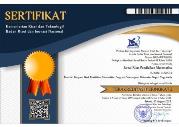Unveiling the TPACK profile: Exploring mathematics prospective teachers in the micro teaching course
Tatu Munawaroh, Faculty of Teacher Education and Educational Sciences, Mathla’ul Anwar University, Banten, Indonesia
Ika Meika, Faculty of Teacher Education and Educational Sciences, Mathla’ul Anwar University, Banten, Indonesia
Ratu Mauladaniyati, Faculty of Teacher Education and Educational Sciences, Mathla’ul Anwar University, Banten, Indonesia
Ika Yunitasari, Faculty of Teacher Education and Educational Sciences, Mathla’ul Anwar University, Banten, Indonesia
Asep Sahrudin, Faculty of Teacher Education and Educational Sciences, Mathla’ul Anwar University, Banten, Indonesia
Asep Sujana, Faculty of Teacher Education and Educational Sciences, Mathla’ul Anwar University, Banten, Indonesia
Rusdian Rifa’i, Faculty of Teacher Education and Educational Sciences, Mathla’ul Anwar University, Banten, Indonesia
Eka Rosdianwinata, Faculty of Teacher Education and Educational Sciences, Mathla’ul Anwar University, Banten, Indonesia
Deni Pratidiana, Faculty of Teacher Education and Educational Sciences, Mathla’ul Anwar University, Banten, Indonesia
Mulyanah Mulyanah, Faculty of Teacher Education and Educational Sciences, Mathla’ul Anwar University, Banten, Indonesia
Abstract
Keywords
Full Text:
PDFReferences
Alhamid, I. S. G., & Mohammad-Salehi, B. (2024). Examining EFL Teachers’ Technological Pedagogical Content Knowledge (TPACK) and their Attitudes towards Online Teaching. LEARN Journal: Language Education and Acquisition Research Network, 17(1), 715–733.
Alqurashi, E., Gokbel, E. N., & Carbonara, D. (2017). Teachers’ knowledge in content, pedagogy and technology integration: A comparative analysis between teachers in Saudi Arabia and United States. British Journal of Educational Technology, 48(6). https://doi.org/10.1111/bjet.12514
Ball, A., Joyce, H. D., & Anderson-Butcher, D. (2016). Exploring 21st Century Skills and Learning Environments for Middle School Youth. International Journal of School Social Work, 1(1). https://doi.org/10.4148/2161-4148.1012
Baumert, J., Kunter, M., Blum, W., Klusmann, U., Krauss, S., & Neubrand, M. (2013). Cognitive activation in the mathematics classroom and professional competence of teachers: Results from the COACTIV project. In Cognitive Activation in the Mathematics Classroom and Professional Competence of Teachers: Results from the COACTIV Project. https://doi.org/10.1007/978-1-4614-5149-5
Chien, C. W. (2019). Taiwanese EFL undergraduates’ self-regulated learning with and without technology. Innovation in Language Learning and Teaching, 13(1), 1–16. https://doi.org/10.1080/17501229.2016.1264076
Cohen, L., Manion, L., & Morrison, K. (2017). Research Methods in Education. Routledge. https://doi.org/10.4324/9781315456539
Copur-Gencturk, Y., & Tolar, T. (2022). Mathematics teaching expertise: A study of the dimensionality of content knowledge, pedagogical content knowledge, and content-specific noticing skills. Teaching and Teacher Education, 114(April), 103696. https://doi.org/10.1016/j.tate.2022.103696
Koehler, Mishra, C. (2009). What Is Technological Pedagogical Content Knowledge (TPACK)? Contemporary Issues in Technology and Teacher Education, 9(1), 60–70. Retrieved from https://doi.org/10.1177/002205741319300303
Lestari, S. (2018). Peran Teknologi dalam Pendidikan di Era Globalisasi. EDURELIGIA; Jurnal Pendidikan Agama Islam, 2(2). https://doi.org/10.33650/edureligia.v2i2.459
Lubis, A. H. (2018). Ict integration in 21st-century Indonesian english language teachingmyths and realities. Cakrawala Pendidikan, 37(1), 11–21. https://doi.org/10.21831/cp.v37i1.16738
Nevrita, N., Asikin, N., & Amelia, T. (2020). Analisis Kompetensi TPACK pada Media Pembelajaran Guru Biologi SMA. Jurnal Pendidikan Sains Indonesia, 8(2). https://doi.org/10.24815/jpsi.v8i2.16709
Njiku, J., Mutarutinya, V., & Maniraho, J. F. (2020). Developing technological pedagogical content knowledge survey items: A review of literature. Journal of Digital Learning in Teacher Education, 36(3), 150–165. https://doi.org/10.1080/21532974.2020.1724840
Nuangchalerm, P. (2020). Tpack in asean perspectives: Case study on thai pre-service teacher. International Journal of Evaluation and Research in Education, 9(4). https://doi.org/10.11591/ijere.v9i4.20700
Nurhalimah, N., Baisa, H., & Asmahasanah, S. (2020). Pengaruh Kompetensi Pedagogik Guru terhadap Motivasi Belajar Siswa di MI I’Anatusshbiyan. JPG: Jurnal Pendidikan Guru, 1(1). https://doi.org/10.32832/jpg.v1i1.2865
Mdhlalose, D., & Mlambo, G. (2023). Integration of Technology in Education and its Impact on Learning and Teaching. Asian Journal of Education and Social Studies, 47(2), 54–63. https://doi.org/10.9734/ajess/2023/v47i21021
Mishra, P., & Koehler, M. J. (2006). Technological Pedagogical Content Knowledge: A Framework for Teacher Knowledge. Teachers College Record, 108(6), 1017–1054. https://doi.org/https://doi.org/10.1111/j.1467-9620.2006.00684.x
Rafi, I., & Sabrina, N. (2019). Pengintegrasian TPACK dalam Pembelajaran Transformasi Geometri SMA untuk Mengembangkan Profesionalitas Guru Matematika. SJME (Supremum Journal of Mathematics Education), 3(1). https://doi.org/10.35706/sjme.v3i1.1430
Safari, M., Jaenudin, R., & Koryati, D. D. (2014). Analisa Gaya Mengajar Guru Ekonomi di SMA Negeri Se-Kecamatan Lahat. Journal Profit, 1(2). https://doi.org/http://dx.doi.org/10.36706/jp.v1i2.5607
Santos, J. M., & Castro, R. D. R. (2021). Technological Pedagogical content knowledge (TPACK) in action: Application of learning in the classroom by pre-service teachers (PST). Social Sciences and Humanities Open, 3(1), 100110. https://doi.org/10.1016/j.ssaho.2021.100110
Surani, D. (2019). Studi literatur: Peran teknologi pendidikan dalam pendidikan 4.0. Prosiding Seminar Nasional Pendidikan FKIP, 2(1). https://jurnal.untirta.ac.id/index.php/psnp/article/view/5797
Swallow, M. J. C., & Olofson, M. W. (2017). Contextual Understandings in the TPACK Framework. Journal of Research on Technology in Education, 49(3–4). https://doi.org/10.1080/15391523.2017.1347537
DOI: https://doi.org/10.21831/jrpm.v10i2.64215
Refbacks
- There are currently no refbacks.
Copyright (c) 2023 Jurnal Riset Pendidikan Matematika

This work is licensed under a Creative Commons Attribution-ShareAlike 4.0 International License.
Jurnal Riset Pendidikan Matematika indexed by:

Jurnal Riset Pendidikan Matematika by http://journal.uny.ac.id/index.php/jrpm/index is licensed under a Creative Commons Attribution-ShareAlike 4.0 International License.
All rights reserved. p-ISSN 2356-2684 | e-ISSN 2477-1503
View My Stats















